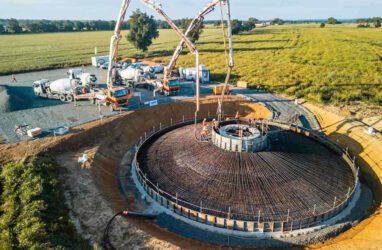Feed aggregator
INTERVIEW: Investors chilled by noise of European Green Deal unravelling
EU Commission earmarks larger budget for 2025, but climate action sum unchanged
Biochar producer announces first pre-purchase agreement in boost for nascent UK carbon removal market
‘No credible reason’ to expect cheaper power bills under Peter Dutton’s nuclear energy plan, experts say
Tony Wood of the Grattan Institute rejects Coalition’s claim electricity prices are high due to Labor’s renewables policy
Peter Dutton’s claim that nuclear energy would lead to cheaper power bills has been rejected by energy experts, with one saying there was “no credible reason” to think adding “the most expensive form of bulk electricity” would cut prices.
They said a range of evidence, including a recent CSIRO analysis, suggested nuclear power would be more expensive than other options, and that solar and wind system under construction – supported by firming technology – was the cheapest option.
Continue reading...EU must manage social impacts of carbon pricing, business group warns
Activists spray Stonehenge with orange powder paint ahead of summer solstice – video
Two people have been arrested after Just Stop Oil activists sprayed orange powder paint over Stonehenge. Members of the public tried to stop the incident and a visitor managed to wrestle a spray can from one of the protesters. According to Wiltshire police, two people have been arrested. The prime minister condemned the incident, saying: 'This is a disgraceful act of vandalism to one of the UK's and the world's oldest and most important monuments.'. Just Stop Oil says it took the action to demand the incoming government sign up to a legally binding treaty to phase out fossil fuels by 2030
Continue reading...EU-China agree to cooperate on emissions trading
Report urges Australia not to let coal mines self-report methane emissions
DATA DIVE: The European countries set to capitalise on demand for carbon storage
EU nations call to tweak how ETS is applied to shipping sector to avoid carbon leakage
Huge REDD carbon project planned in Mozambique
Indigenous-led organisation says communities want to explore biodiversity credits
Sunak’s government has almost destroyed Natural England – just for doing its job | Guy Shrubsole
After the election, Labour must end the attacks on a watchdog that is simply trying to protect what little wildlife we have left
England likes to think of itself as a green and pleasant land, yet the Conservatives have been waging a vicious political war against Natural England, the watchdog that is supposed to protect the countryside. During the past decade and a half, Natural England has been undermined by austerity and rendered toothless by deregulation. The Conservative government slashed the organisation’s already insufficient budget by two-thirds, rendering it incapable of carrying out even basic functions. Almost half of England’s nature reserves have not been monitored by government ecologists in recent years, and only 39% of our sites of special scientific interest (SSSIs) are now in “favourable condition”.
It’s much the same story as what has happened to the Environment Agency. Yet in recent years, spending cuts have been the least of Natural England’s worries. The watchdog has also had to withstand a barrage of attacks from Tory MPs, landowners, developers, the shooting lobby and even environment ministers. And under Rishi Sunak’s government, it has come close to being destroyed entirely – simply because it tried to do its job.
Guy Shrubsole is an environmental campaigner and the author of The Lost Rainforests of Britain, Who Owns England? and the forthcoming The Lie of the Land
Forest carbon coalition partners with MRV tech firm
South Korea to launch CCU ‘mega project’ to assist industrial decarbonisation drive
‘I have seen the decline’: pesticides linked to falling UK insect numbers
Experts say invertebrates are exposed to range of chemicals, some of which are 10,000 times more toxic than DDT
Prof Lynn Dicks has had her hands in the soil for almost three decades – and she has watched it slowly become stripped of invertebrate life.
“In my life, I have seen the decline,” says Dicks, an ecology professor at the University of Cambridge. She knows it from the data: “The data we have of long-term trends in insect abundance over time, that the decline rates are, on average, about 1% a year.
Continue reading...Euro Markets: Midday Update
World’s first wind turbine foundation poured from decarbonised concrete
The post World’s first wind turbine foundation poured from decarbonised concrete appeared first on RenewEconomy.
Fortescue invests more in “self-erecting” wind tower innovator
The post Fortescue invests more in “self-erecting” wind tower innovator appeared first on RenewEconomy.





